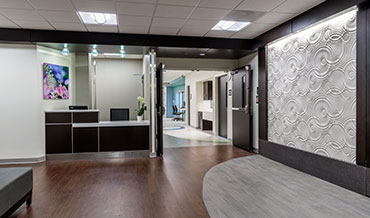We designed our NICUs with the entire family in mind. You’ll find the space and support your family needs to care for and bond with your baby.
Our neonatologists and NICU nurses use advanced technology to provide expert, around-the-clock care for babies born early (premature) or with certain health conditions.
And we provide the highest level of care close to home. Rush University Medical Center in Chicago is a level IV regional NICU (the highest level) and Rush Copley Medical Center in Aurora is a level III NICU.
We offer the following benefits during your time in the NICU:
- Private rooms: Each baby receives a private room, so you can stay with your baby as often as you are able. Your presence fosters improved brain growth and development in babies with low birth weight. An individual room also allows you to have private conversations with your baby’s health care team.
- Access to your baby, anytime: You are welcome to be with your baby at any time — 24 hours a day, seven days a week.
- Secured and safe space: Our NICUs are locked units for the safety of babies. Parents must always wear ID bands and accompany any guests. To prevent infection and for security, we also limit the number of visitors allowed in a baby’s room.
- Supporting your breastfeeding goals: Studies show breast milk is a powerful tool in helping small and vulnerable babies. You will be able to pump and provide your own breast milk until your baby is strong enough to latch. Our lactation specialists will assist you with pumping and breastfeeding.
- Transparent communication with your care team: Our neonatologists will see your baby at least daily, in addition to the support of your baby’s nursing staff. If you are not able to be in the NICU when your doctor visits, you will have the option of speaking with your care team via phone or video conference. You may also check on the status of your baby at any time through dedicated phone lines to our nursing team.
- Dedicated rooms for parents: Our NICUs offer family rooms — calm spaces to read a book, watch a movie or catch up on work, many of the activities often interrupted by your hospital stay.

Rush Excellence in Neonatal Intensive Care
- Baby-friendly designation: Rush University Medical Center is a Baby-Friendly Designated birth center — one of few hospitals in Illinois to receive this honor. Baby-Friendly USA, a World Health Organization-affiliated institution, awards this prestigious international designation to hospitals that provide a high level of care, support and education to breastfeeding mothers and their babies to help them successfully initiate and continue breastfeeding.
- High level of care close to home: When it comes to caring for little ones, we have high-quality care located where it’s most convenient for you and your family. At Rush University Medical Center, we provide excellent care in our level IV regional NICU, which includes access to pediatric subspecialists and surgeons. If your infant needs specialized care in the western suburbs, Rush Copley Medical Center, a level III NICU, offers a variety of specialists to cater to the unique needs of premature babies and other high-risk newborns.
- Nearby delivery and postpartum rooms: When seconds matter most, our NICU services at both Rush hospitals are just steps away from our delivery or operating rooms. Our postpartum recovery rooms also neighbor the NICU, so you can conveniently visit your baby at any time.
- Highly trained providers, comprehensive care: Neonatologists and specially trained NICU nurses staff our Rush NICUs 24 hours per day, monitoring and treating your baby with expert care. When needed, they also partner with our pediatric subspecialists to treat your baby’s specific medical needs.
- Expert respiratory care for newborns: Rush offers expert respiratory therapists to help babies with breathing problems. They have all successfully completed the Neonatal Resuscitation Program and are licensed, registered therapists through the state. Many of the respiratory therapists are also neonatal/pediatric and ECMO specialists.
- Coordinated care with fetal and neonatal medicine specialists: At Rush University Medical Center, our NICU team works closely with specialists in our Fetal and Neonatal Medicine Center, which offers comprehensive care for high-risk, complex pregnancies and babies who have a wide range of medical problems, such as issues with heart, brain and intestinal development.
- Parents as partners: We believe in family-centered care. Parents are critical to their babies’ development and should be deeply involved in the care of and medical decisions for their babies. As part of our family-centered approach, we encourage skin-to-skin contact for all babies born at Rush. Babies rest directly on a parent’s chest, after delivery or when the baby is stable, which has shown to improve babies’ heart rates, breathing patterns, temperature regulation and neurodevelopment.
- Committed to quality and safety: Rush University Medical Center is a member of the Vermont Oxford Network, which includes over 1,000 NICUs from around the world. Each NICU submits data to the network, with the shared goal of improving quality, safety, value of care and outcomes for newborns and their families. The Medical Center is also a member of the Illinois Perinatal Quality Collaborative, which is a statewide network committed to improving care and outcomes for babies and parents.
If your baby was premature or born with a health condition, you may face a variety of medical issues. Our NICU providers will manage your baby’s treatment with compassionate and expert care. Our providers are specially trained to treat the following conditions:
- Anemia
- Bradycardia (Interrupted Breathing or Apnea)
- Breathing Problems
- Congenital Diaphragmatic Hernia
- Feeding Issues
- Gastroschisis
- Genetic Disorders
- Hypoglycemia (Low Blood Sugar)
- Intrauterine Growth Restriction
- Intraventricular Hemorrhage (Bleeding in the Brain)
- Jaundice
- Macrosomia
- Multiple Births
- Necrotizing Enterocolitis
- Neonatal Heart Conditions
- Pneumonia
- Premature Babies
- Respiratory DIstress Syndrome (RDS)
- Retinopathy of Prematurity (ROP)
- Sepsis (Blood Stream Infection)
Testing is an important part of your baby’s NICU care. Conducting tests will give us more information about your baby’s health and if treatments are working. Certain tests will require your permission, and all tests and treatments will be discussed with you during your regular visits with our providers.
- Blood Test / Heel Stick
- CAT Scan or CT Scan
- Echocardiogram
- EKG or ECG (Electrocardiogram)
- Eye Exam
- Car Seat Test
- Hearing Screening
- MRI
- Newborn Screening Test
- Oxygen Saturation
- ROP Exam (Retinopathy of Prematurity)
- Ultrasound
- Urine Test
- Weight Check
- X-Ray
Your neonatologist will recommend treatments specific to your baby’s health conditions to promote growth and development. Working together, your NICU team will manage your baby’s care plan and discuss progress during your provider meetings.
- Antibiotic Therapy
- Blood Transfusion
- Chest Tube Placement
- Continuous Positive Airway Pressure (CPAP)
- Developmental Interventions
- Endotracheal Intubation
- Exchange Transfusion
- Hemodynamic Monitoring
- Hemodialysis
- Intravenous Access and Maintenance
- Nasogastric Tube (NG or Feeding Tube)
- Oxygen Saturation Monitoring
- Palliative Care
- Pediatric Subspecialty Consultations
- Peritoneal Dialysis
- Phototherapy (Bili Light)
- PICC Line Placement
- PO/Gavage Feeding
- Pre- and Post-Operative Care
- Respiratory Care Consultation
- Skin-to-Skin Contact
- Surfactant Administration
- Surgery
- Therapeutic Hypothermia (Whole Body Cooling)
- Thermoregulation
- Treatment and Support for Patients with Neonatal Abstinence Syndrome
- Total Parenteral Nutrition
- Umbilical Line Placement
- Ventilator Management (including High Frequency Ventilation and Nitric-Oxide Treatment)


